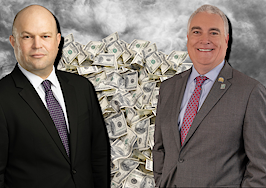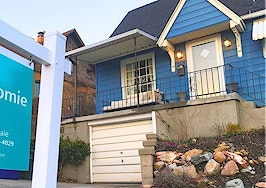- Brokers should think about a pie with three slices: agent income, expenses and profit.
- Different brokerage models spend different proportions on each piece of the pie.
- Knowing what your agents value, and picking a model and sticking to it, are the keys to success.
Brad Inman wrote earlier this week about the breakup of an “empire” — the sale of Better Homes and Gardens Real Estate | Mason-McDuffie, a company with a 100-plus-year history, upon the retirement of my friend and colleague Ed Krafchow.
Brad traces the growth and evolution of Mason-McDuffie over the years and uses the recent news to draw conclusions about the challenges facing real estate brokers in the modern environment.
And those challenges are real.
What are the challenges?
Agents want higher splits. Consumers want to pay less. Industry outsiders want to change (or eliminate!) the whole brokerage dynamic.
And even if you get past all that, you have to hope that the market cooperates and doesn’t go into a nose-dive.
It’s not a business for the faint of heart.
Now, I don’t now anything specific about what happened to Mason-McDuffie, so I can’t speak to the particular conclusions Brad makes about what prompted the recent sales.
But I can say that all brokerages, whatever their history, whatever their business model, face the same basic challenge. After all, the brokerage business, at its heart, is very simple.
You recruit and retain agents, you attract consumers, you sell houses and thereby generate revenue.
Where does the revenue go?
Think about a pie with three slices:
Slice No. 1: Agent income
This is the biggest slice — the agent commission split of that revenue, which can be anywhere from 50 percent to 100 percent of the total, depending on your business model.
Slice No. 2: Expenses
After you’ve paid the agents, you have to pay for your facility costs, advertising, staff, management, marketing — basically, all the stuff that supports your efforts to recruit those agents, attract those consumers and sell those houses.
Slice No. 3: Profit
Finally, after you’ve paid your expenses and paid your agents, you get to keep the rest as profit.
How much of the total becomes profit? Well, if you’re lucky, you’re getting 5 percent of the total revenue as net income.
Basically, managing a brokerage is all about keeping a balance in that relationship between agent income and expenses, and you have different models you can use to reach that goal.
What are the models?
You have your “traditional model,” in which the broker picks up most of those expenses for the agents and provides a high level of service, but consequently pays out a smaller amount as agent income.
Then you have your “fee-based model,” where the broker passes along most of the expenses in the form of fees, reduces the array of services provided, and thereby can pay out a higher agent income.
And then, finally, you get your “hybrid” brokers, who find some middle ground where they pay higher splits than the traditional broker, while still trying to provide more services than a fee-based brokerage.
You can make a profit in any model, so long as you keep that balance.
Raise the splits, and you have to lower the expenses. Take on expense, and you’re going to have to either pay lower agent income or take a lesser (or no!) profit.
The pie is the pie — you can only slice it up so many ways.
How do you keep balance?
Most importantly, you have to know what kind of broker you want to be. You can be successful in any model; you just have to be disciplined in how you follow it.
You can’t fall into the trap of defining yourself as, say, an agent-centric brokerage paying high splits, but then paying for service after service to attract agents, without running yourself out of business.
You can’t pay the agents and pay the expenses. Define who you are, and live with that choice.
And within that choice, whatever it is, make sure to control your expenses.
Why? Because any time you take a dollar out of the expenses, you can raise your agent income or your profit.
And that’s a good thing, because you’re in business to make money for you or your agents, not to pay expenses to your landlord or advertising company or whomever.
Here’s the key: Only pay for stuff your agents value, and don’t pay for anything else.
What do agents value?
Do your agents really value expensive retail space, or would they prefer a small bump in split that would come from moving into less costly office space in a corporate park somewhere?
Do they value you paying for that Zillow package, or would they rather have a higher split and make the decision about paying for it themselves?
Do they value hands-on managerial experience, brand marketing, holiday parties, reward trips — all that good stuff?
They might like it and will take it if you give it. But if asked, would they prefer that you eliminate that stuff and just, you know, raise their splits?
If so, get rid of it. Pay less to your creditors and more to your agents. And if you can keep just a little bit of the savings as your profit, that’s good, too.
On the other hand, if you find that you can add an expense that will draw in agents and help you retain the agents that you already have, then by all means — add it. You’ll be increasing your expense slice, but if the agents value it, then it will hopefully justify itself with higher revenues.
The key is to know your agents, and what they want. Don’t assume they have the same priorities that they had 10 years ago. Or the same priorities you have. Or the same priorities agents at other companies have. Or the same priorities that the sales guys from the hot new tech company will tell you they have.
Know what they value, figure out a cost-effective way to give it to them, execute well — and cut expenses on the rest.
I mean, it’s really no different from any business.
Do that, and you’ll certainly survive, if not thrive, in any market, in any business.
What’s the biggest challenge?
So is that what happened to Mason-McDuffie? Did they get unbalanced, losing sight of what their agents valued?
I have no idea. I’m not so sure that anything at all “happened,” other than Ed Krafchow deciding to retire.
But if you want to think about the challenges facing real estate brokerages, I don’t think it’s about internet leads or technology or disruption or overfunded startups or any of the hot, trendy topics that Brad identifies.
I think they’re distractions, or maybe symptoms of the larger issue.
No, I think the biggest challenge brokers face is simply keeping that balance: maintaining the discipline of paying only for what their agents actually value, and eliminating the pointless expenses that take away income from the agents or profit from the brokers.
If you keep that balance, you can be successful under any business model. You can be a big multi-state broker with thousands of agents and a seven-figure monthly expense nut. You can be a capped-company-dollar broker passing expenses through and realizing a profit on fees. You can even be a “broker as landlord” shop charging $99 per month for a desk, coffee and printer.
The model doesn’t matter. What matters is that you know what kind of broker you want to be, and then be that broker.
Know your agents. Know your clients. Know your market.
But most of all, know yourself.
Joe Rand is one of the managing partners of Better Homes and Gardens Real Estate – Rand Realty in New York and New Jersey and blogs about his local markets at the Rand Country Blog and about the industry at joerand.com.












